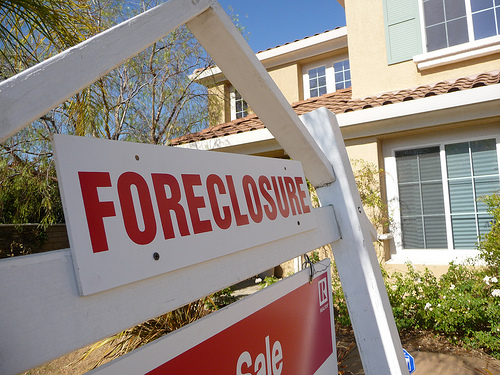
Flickr/respres
The Florida Attorney General’s office announced today new investigations into three of the state’s biggest law firms handling foreclosure cases, otherwise known as “foreclosure mills”—including the law firm run by multimillionaire David J. Stern, the subject of a Mother Jones investigation last week. The probes, led by the AG’s Economic Crimes Division, are examining whether “improper documentation may have been created and filed with Florida courts to speed up foreclosure processes, potentially without the knowledge or consent of the homeowners involved,” according to a press release. The other two firms targeted by the AG are the Law Offices of Marshall C. Watson and Shapiro & Fishman, who, together with Stern’s firm, handle a vast number of the foreclosure cases now clogging Florida’s courts system.
As I reported last week, foreclosure mills like Stern’s are well-greased, assembly line-like operations that try to squeeze profits from every step of the foreclosure process, from the filing of the legal complaint (in states where foreclosures are a judicial matter) to litigating the foreclosure to the selling of repossessed homes—or as they say in the industry, from “cradle to grave.” As a result, the mills’ economic interest arguably runs to counter to the well-being of your average homeowner. Stern himself admitted so much, in an investor presentation earlier this year: “When people say, ‘Oh, my god, the economy is bad,’ I’m like, ‘Oh, my god, it’s great.’ I hate to hear people are losing homes, and credit isn’t available, and people’s credit is such that they can’t [refinance]. But if you are in our niche, it’s what we want to do, and it’s what we want to see.”
Of the Stern law firm, I further reported:
Over the past decade and a half, Stern has built up one of the industry’s most powerful operations—a global machine with offices in Florida, Kentucky, Puerto Rico, and the Philippines—squeezing profits from every step in the foreclosure process. Among his loyal clients, who’ve sent him hundreds of thousands of cases, are some of the nation’s biggest (and, thanks to American taxpayers, most handsomely bailed out) banks—including Wells Fargo, Bank of America, and Citigroup. “A lot of these mills are doing the same kinds of things,” says Linda Fisher, a professor and mortgage-fraud expert at Seton Hall University’s law school. But, she added, “I’ve heard some pretty bad stories about Stern from people in Florida.”
Stern’s firm and Stern himself have, over the years, faced an array of damaging lawsuits. They include blithely foreclosing on homeowners who’d never defaulted (pdf), gouging homeowners who were trying to get out of default (pdf), and even sexual harassment (pdf). I began my story, titled “Fannie and Freddie’s Foreclosure Barons,” with an anecdote about a foreclosure defense employee, Ariane Ice, who’d discovered a number of backdated documents. Stern’s firm, she realized, had used the documents to foreclose on Florida homeowners. And these weren’t minor documents, either: They were “assignments of mortgage,” a crucial piece of evidence showing who owns the mortgage and thus has the legal right to foreclose on it. From reading the AG’s press release, it looks like they’ve clued into that assignment funny business:
Because many mortgages have been bought and sold by different institutions multiple times, key paperwork involved in the process to obtain foreclosure judgments is often missing. On numerous occasions, allegedly fabricated documents have been presented to the courts in foreclosure actions to obtain final judgments against homeowners. Thousands of final judgments of foreclosure against Florida homeowners may have been the result of the allegedly improper actions of the law firms under investigation.
The AG’s office is also investigating foreclosure mills’ use of offshore affiliates to pump out legal filings. Again, this sounds like Stern’s firm, which maintains an offshore operation described in an SEC filing as “a scalable, low-cost operation in Manila, Philippines that provides data entry and document preparation support.” In other words, a paper mill on the other side of the world that churns out legal documents.
Sounds similar to me. The AG’s office sent me copies of the subpoenas for each of three investigations, which are embedded below. I’ll add more on the subpoenas’ content when I get done reading through them.
Read the Florida AG’s subpoenas sent to three major foreclosure mills as part of a new investigation:













